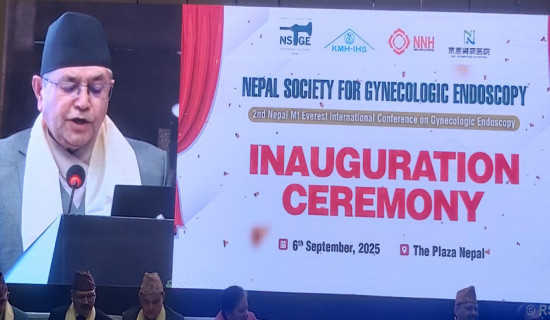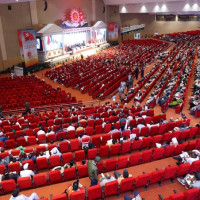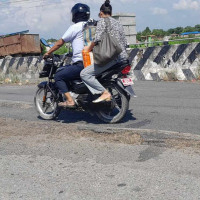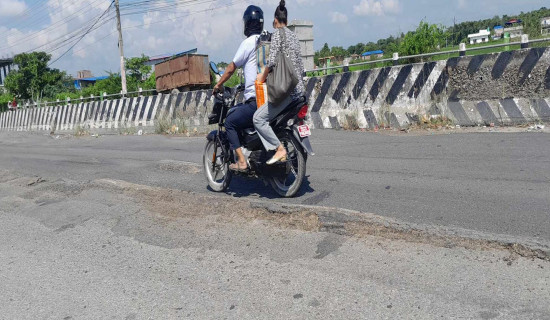- Sunday, 7 September 2025
PM returns home from LLDC conference in Awaza
By A Staff Reporter,Kathmandu, Aug. 10: Prime Minister KP Sharma Oli returned home after participating in the Third United Nations Conference on Landlocked Developing Countries (LLDC3), held from 5 to 8 August in Awaza, Turkmenistan, on Friday.
He reached there leading the Nepali delegation on August 3 upon invitation from the President of Turkmenistan, Serdar Berdimuhamedov, and the UN Secretary-General, António Guterres.
On 5 August, Prime Minister Oli addressed the conference as Chair of the Least Developed Countries (LDCs) group and representative of Nepal, and talked about key challenges faced by landlocked developing countries, including infrastructure deficits, limited market access, dependence on primary product exports, high transport costs, low foreign investment, and adverse impacts of climate change.
He emphasised the need for enhanced cooperation among LLDCs and increased support from development partners.
PM Oli expressed confidence that the Awaza Programme of Action would serve as a milestone in transforming LLDCs from being landlocked to land-linked, transport-dependent to trade-competitive, and climate-vulnerable to climate-resilient countries.
Speaking at various forums and panels, he highlighted Nepal’s efforts in developing smart infrastructure, expanding highways and railways, building trade routes, and establishing green energy corridors to improve cross-border connectivity. He called on neighbouring countries, development partners, and donors to support Nepal’s development efforts.
During the conference, Prime Minister Oli co-chaired the High-Level Thematic Roundtable on ‘Seizing the Transformative Potential of Trade, Trade Facilitation, and Regional Integration for LLDCs,’ where he noted the challenges LLDCs face due to lack of direct sea access and high transport costs. He stressed the need for concrete actions to improve the living standards of over 600 million people in these countries.
Prime Minister Oli also addressed roundtables on ‘Structural Transformation, Diversification, and Science, Technology and Innovation (STI) as Drivers of Prosperity in LLDCs,' urging the use of STI to enhance productivity, resource mobilisation, employment, and integration into global value chains. He called for developed countries to assist in capacity building and technology transfer.
He also highlighted the need to improve LLDCs’ access to climate finance, develop effective adaptation measures, utilise the Loss and Damage Fund, build capacity, and facilitate technology transfer.
Likewise, in the session on infrastructure, connectivity and transits, he underscored the importance of partnerships among transit countries, development partners, and the international community. He highlighted the need for innovative financial mechanisms, technology transfer, and capacity-building tailored to LLDCs’ specific requirements.
Prime Minister Oli stressed that trade and transport connectivity should be taken as key to sustainable cooperation, inclusive prosperity, and regional integration.
He addressed the Ministerial Meeting on South-South Cooperation, emphasising the need to strengthen cooperation among developing countries and expand physical and digital infrastructure at regional level.
On the sidelines, Prime Minister Oli held bilateral meetings with President Serdar Berdimuhamedov of
Turkmenistan and Prime Minister Adylbek Kasymaliev of Kyrgyzstan, where issues of mutual interest were discussed.
He also met Rabab Fatima, UN High Representative for LDCs, LLDCs, and Small Island Developing States, to discuss global cooperation for solving LLDC challenges.
Similarly, he held courtesy meetings with Jin Liqun, President of the Asian Infrastructure Investment Bank (AIIB), and Ismail Ersahin, CEO of the World Association of Investment Promotion Agencies (WAIPA), focusing on investment promotion in Nepal’s priority sectors.
PM Oli’s delegation included his spouse Radhika Shakya, Chief Advisor Bishnu Prasad Rimal, lawmaker Surya Bahadur Thapa Kshetri, and senior government officials.



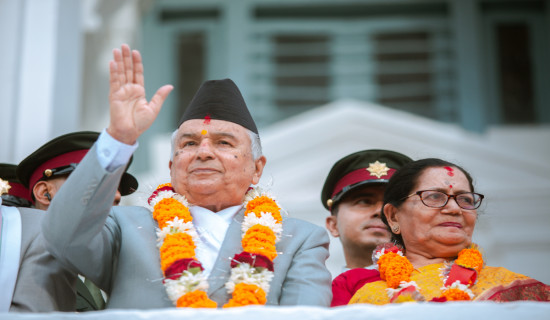
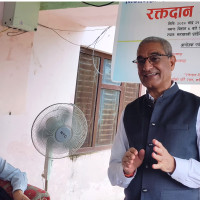
-square-thumb.jpg)
